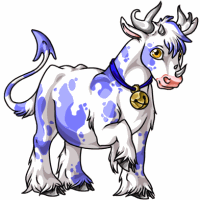


Bovyne
(BOW-vine)
When traveling through the vast plains over Subeta, a particular creature will show up again and again, dotting the farmland all the way to the horizon with their presence. Tails swishing and ears twitching, they will occasionally look up from grazing on grass to blink slowly at passers-by, before returning to their favorite pastime: eating. To some, bovynes may be such a regular sight that they barely acknowledge the animals as they pass them. To many, however, bovynes represent many things - from livelihood and stable living to a loyal, kind companion - and they never hesitate to stop and pet a bovyne's soft nose or scratch their cheeks.
The bovyne has been domesticated on Subeta for several generations. They are an extremely stocky animal, standing at around 46 inches, (117cm) but weighing anywhere from 775-900 pounds (352-409kg) on average. They are excellent grazers, readily consuming a variety of grasses, hedges, weeds, flowers, and hay. Because their diets are so adaptable, they are easily raised all over Subeta. Bovyne are often kept in small herds, where the females co-parent their infants with other mothers, sharing both milk -and- discipline duty! Their milk is used in products all over, from the finest cheese to the cream in coffee to a refreshing dish of ice cream, and this is the bovyne's most prized asset. In fact, it is not unusual for those with enough land to own their own bovyne to provide access to fresh milk. Milk is of course not the only resource a bovyne provide, however. Their meat is used in many dishes, and everyone from the average home cook to the finest chefs in Centropolis rely on its availability. Raising bovyne in this manner is considered a source of pride in Subeta, since bovyne ranchers have a strict code they follow regarding the use of their animals: not only is the meat used, but the hide is used in leather, the waste as manure, and the bones used for glue, jewelry, medicine, and everything and anything in between.
Bovynes make fine pets off the farm as well, although larger cities often have regulations against owning them due to their size! They do require enough space to have grazing grounds, and they do like to be kept challenged with various games and toys. Some can even be taught to ride, although most would prefer a simple petting or grooming session. Female bovynes often make better pet due to their gentle, loyal natures; the males tend to be much more stubborn and bull-headed! The males also have much longer horns than the female, which can certainly be dangerous to the unassuming owner.
Perhaps the most enjoyable fact about the bovynes is nearly universally, they are all adorned with a ribbon collar featuring a very large bell. This is true of all bovynes, from young calves to pets to farm animals. The story goes that many years ago, a farmer's son and his boyvne wandered off and became lost during a harsh winter storm. Everyone thought they were sure to die, but the young boy was quite resourceful for his age. He fashioned a large bell out of a found hollow gourd, filling it with dried seeds. Using his shoelaces, he tied the gourd around his bovyne's neck and had her begin to lead the way back home. Late at night, after the storm had stopped and all was quiet, the search party could hear the sound from the gourd as it swung around the bovyne's neck. They were able to follow the sound and rescue both the boy and his beloved friend. She was honored above all other creatures on the farm, and bovynes have worn bells as a sign of their unwavering loyalty ever since.
Bovyne has been viewed 2,283 times.
[Search]